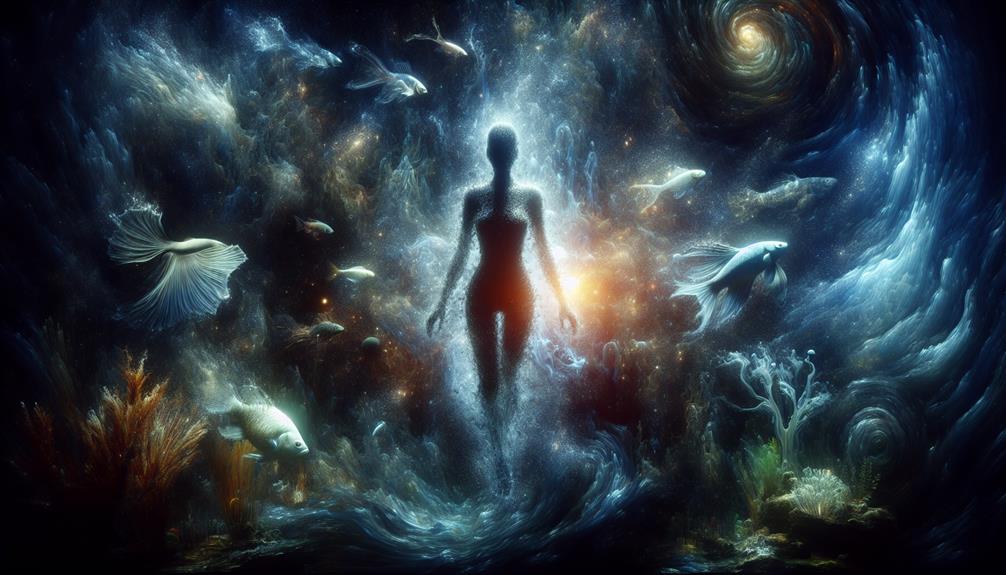Imagine a world where the ocean's depths hold secrets beyond your wildest imagination. The idea of mermaids has captured the human imagination for centuries, but can these mythical creatures actually exist?
As you ponder the question, historical accounts and folklore, as well as scientific possibilities, may offer intriguing insights into this age-old mystery. Are you ready to explore the evidence and considerations that could shed light on the possibility of mermaids?
Historical Accounts and Folklore
Historical accounts and folklore surrounding mermaids have been passed down through generations, providing a glimpse into the cultural beliefs and perceptions of these mythical creatures. Throughout history, various cultures have contributed to the rich tapestry of mermaid legends.
One of the earliest known stories dates back to ancient Assyria, where the goddess Atargatis transformed herself into a mermaid out of shame for accidentally killing her human lover. In Greek mythology, sirens lured sailors to their doom with their enchanting songs, depicting a darker and more ominous portrayal of these creatures. Similarly, the folklore of the British Isles tells of merrows, mermaid-like beings that were capable of living both underwater and on land.
These historical accounts and folklore legends reveal the enduring fascination and mystery surrounding mermaids across different civilizations and time periods.
The prevalence of mermaid legends in various societies suggests that these mythical beings have captured the human imagination for centuries. While these accounts are often steeped in folklore and mythology, they offer valuable insights into the cultural significance and symbolism of mermaids. They reflect the human desire to explore the unknown depths of the sea and the enduring connection between humans and the ocean.
However, it's important to approach these accounts with a critical eye, recognizing the influence of cultural beliefs and storytelling traditions in shaping the narratives surrounding mermaids.
Scientific Possibilities
The enduring fascination with mermaids in various cultures throughout history has led to a contemporary exploration of scientific possibilities surrounding the existence of these mythical beings. When considering the potential existence of mermaids, scientists often examine genetic mutations and evolutionary traits that could theoretically result in the development of mermaid-like features. Additionally, oceanic adaptation and aquatic physiology play a crucial role in assessing the feasibility of mermaid existence.
| Genetic Mutations & Evolutionary Traits | Oceanic Adaptation & Aquatic Physiology |
|---|---|
| Research indicates that certain genetic mutations could lead to the development of traits resembling those attributed to mermaids in folklore. | The study of oceanic adaptation and aquatic physiology explores how human-like beings could potentially adapt to an underwater environment. |
| Evolutionary traits related to aquatic life in distant human ancestors are also under scrutiny for their possible influence on the existence of mermaid-like beings. | Understanding the physiological changes necessary for prolonged underwater living is essential in evaluating the plausibility of mermaid existence. |
As researchers delve into the scientific possibilities, they scrutinize genetic mutations and evolutionary traits that may result in mermaid-like features. Furthermore, the exploration of oceanic adaptation and aquatic physiology sheds light on the potential for human-like beings to adapt to underwater environments. While the existence of mermaids remains firmly rooted in mythology and folklore, the scientific community continues to investigate these intriguing possibilities with a blend of skepticism and open-minded curiosity.
Frequently Asked Questions
Are There Any Modern-Day Sightings or Evidence of Mermaids?
In modern times, sightings of mermaids are often attributed to misidentifications of marine creatures or hoaxes. Despite folklore beliefs, scientific evidence supporting the existence of mermaids remains elusive. The debate over mermaids' existence continues, with no conclusive proof to substantiate their presence.
While some individuals claim sightings, these accounts lack empirical evidence and are often dismissed as anecdotal or fictional.
What Do Mermaids Eat and How Do They Survive in the Ocean?
Mermaids have a diverse diet, feeding on fish, crustaceans, and sea plants. Their underwater survival is due to unique adaptations, such as gills for breathing and streamlined bodies for efficient swimming. These adaptations allow them to thrive in the ocean environment.
While the existence of mermaids remains a topic of folklore and myth, their hypothetical survival strategies align with known principles of marine biology.
Can Mermaids Communicate With Humans and Other Sea Creatures?
Yes, mermaids are often depicted as having telepathic communication abilities with both humans and other sea creatures in various cultural depictions.
Many mythological origins portray mermaids as part of an underwater society with complex social structures.
However, from a scientific perspective, there's currently no evidence to support the existence of mermaids or their ability to communicate telepathically.
Such abilities are purely a product of folklore and mythology.
Do Mermaids Have Special Powers or Abilities?
Mermaids, rooted in folklore origins, are often associated with magical abilities in mythological tales. While there's no scientific evidence supporting the existence of mermaids, their purported powers are often depicted in stories and legends.
Some believe that their abilities include enchanting voices and the power to manipulate the sea. However, from a scientific perspective, these traits are likely a result of imaginative storytelling rather than concrete evidence of real creatures with supernatural powers.
How Do Mermaids Reproduce and Raise Their Young?
When it comes to mermaid parenting and raising their young, it's a fascinating topic. Underwater families of mermaids likely have unique methods for reproduction and nurturing their offspring.
While there isn't scientific evidence to support the existence of mermaids, if they did exist, they might've evolved specialized ways to reproduce and care for their young in their underwater habitats.
It's an intriguing concept to explore from a scientific perspective.
Conclusion
In conclusion, while mermaids have been a popular subject in historical accounts and folklore, there's no scientific evidence to support their existence.
Despite this, a survey conducted by the National Ocean Service found that 15% of Americans believe in the possibility of mermaids.
However, without concrete evidence, it's best to approach the topic with skepticism and rely on scientific research to guide our understanding of marine life.

